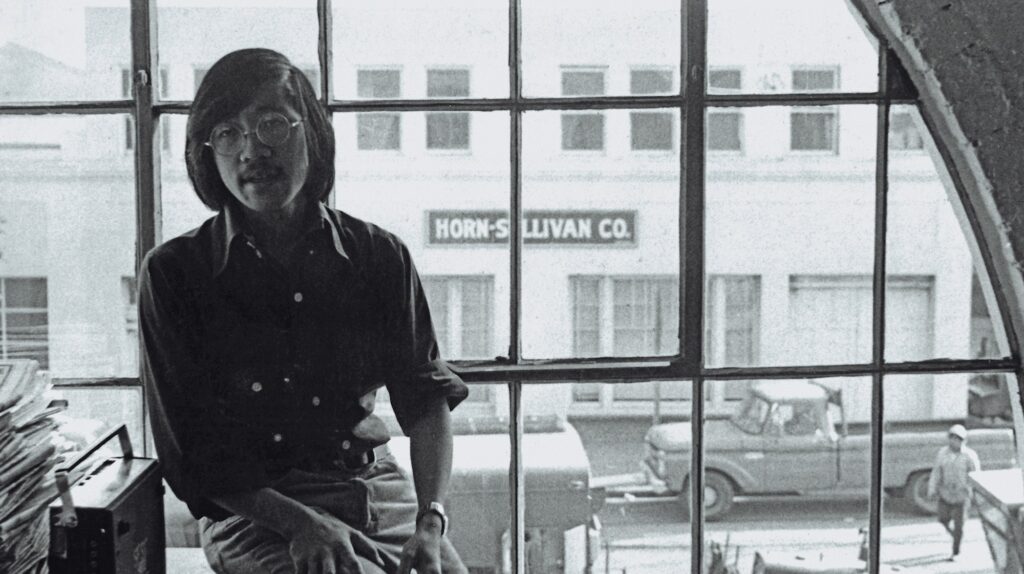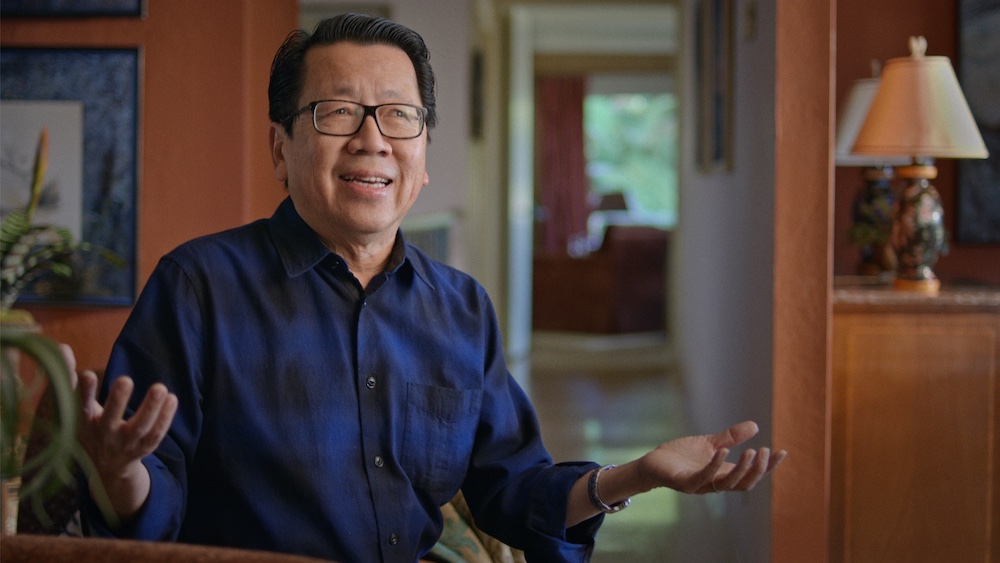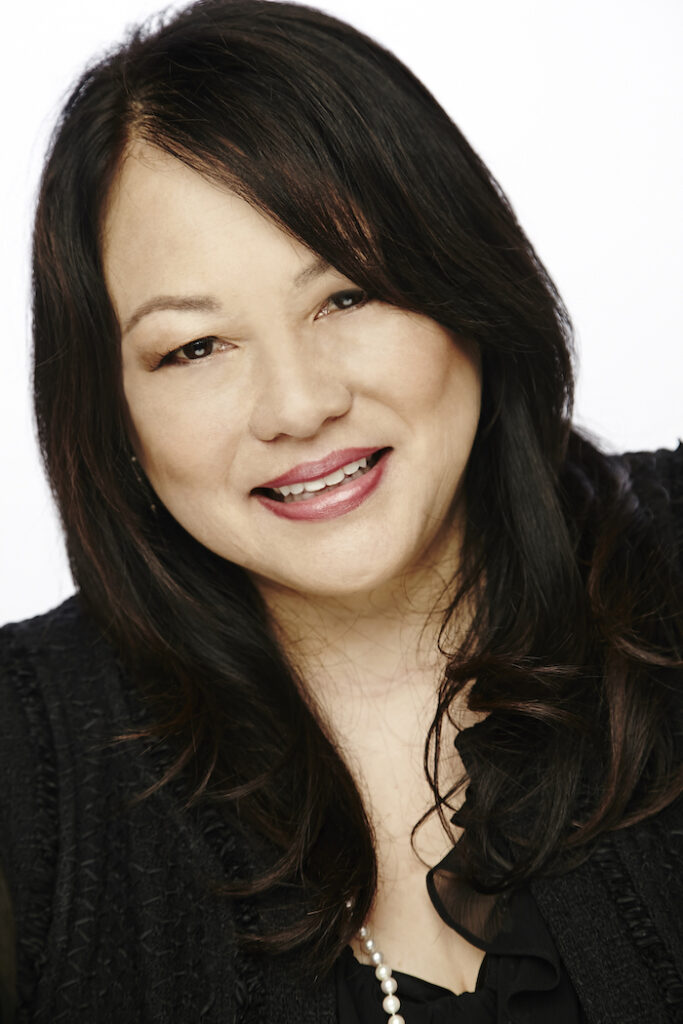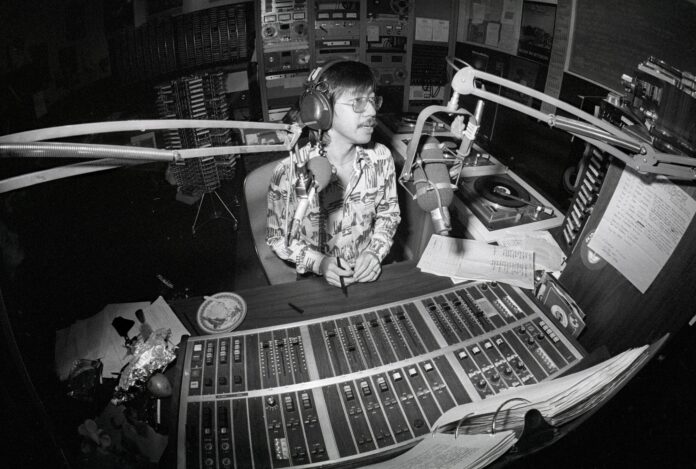San Francisco journalist Ben Fong-Torres is as much of a trailblazer as the artists he’s covered over his five-decade career.
During his tenure at Rolling Stone (1968-1981) as the publication’s first music editor, and the nation’s first national magazine deskman of Chinese American descent, Fong-Torres became almost famous for his cover stories about Bob Dylan, Marvin Gaye, and Jefferson Airplane.
But little was known about the Bay Area native—who’d go on to become a rock DJ for KSAN-FM, an interviewer on KPIX’s “Evening Magazine,” write for the San Francisco Chronicle and Parade magazine, co-anchor KTVU’s Chinese New Year Parade broadcast, and author numerous music biographies—beyond his byline.
Filmmaker Suzanne Joe Kai (a groundbreaker in her own right as the first Asian American woman to become an on-camera staff broadcast journalist for KRON-TV) couldn’t believe that the former Rolling Stone editor’s own cultural contributions weren’t more widely recognized.
So in 2010, with his blessing, she began work on what would become Like a Rolling Stone: The Life & Times of Ben Fong-Torres.
Compiling years of research, archival recordings and video footage, and interviews with Fong-Torres, Sir Elton John, Quincy Jones, Carlos Santana, Bob Weir, Cameron Crowe, publisher Jann Wenner, and photographer Annie Leibovitz, Kai strove to create a more complete portrait of the award-winning journalist.
The almost forgettable side character in Crowe’s semi-autobiographical film, Almost Famous, about the future director’s first assignment for Rolling Stone, takes center stage as a paragon of Asian American excellence in Kai’s movie.
Ahead of Fong-Torres’ appearance at an upcoming screening of Like a Rolling Stone at CAAMFest 40 (Sun/22), I spoke to the man of the hour and 42 minutes about the movie (also currently streaming on Netflix), his storied history as a music journalist, and whether he regrets his decision to stay in what Wenner once called the “cultural backwater” of San Francisco.

48 HILLS What was your reaction when you heard there was interest in making a documentary about you?
BEN FONG-TORRES I had a bit of wariness about focusing on myself. I had already published my memoir several years earlier and didn’t think I needed a documentary.
But in working with Suzanne and in hearing who she had been talking to and still wanted to talk to, the kind of research she did, it soon enough became more than a spotlight on me, my career—and it was more substantial. I appreciated that about Suzanne and her team, and so I got into gear and worked with her all these years.
I am happy with the results, proud of what she and her team have done, and also the response it’s gotten. I think it’s met her goal of telling more than one person’s story.
48 HILLS One of the misconceptions you address in the film is the perceived romanticism of rock journalism’s heyday in the ‘60s and ‘70s. What was it actually like?
BEN FONG-TORRES You’d have a 7000-word cover story that would be due in a couple of weeks or one that’s due a couple of days after you came off the road with Linda Ronstadt, CSNY, or Gladys Knight. It was nonstop working on a treadmill, but at the same time, look at what I’m writing about and editing.
It was more than rock ‘n’ roll; it was also media, politics, and culture, mixing with all the other emerging and named writers, whether it was Tom Wolfe, Hunter Thompson, or the staff we had in our San Francisco offices. So every day was a day of inspiration, energy, and deadlines.
48 HILLS I know your name gets discussed in the film as a point of confusion. Once artists met you, did you find that your racial background was a help or a hindrance?
BEN FONG-TORRES In retrospect I believe it was an advantage. Back then, when I met Carlos Santana and Sly Stone, there was more of a sense of camaraderie, that this is not a white American writer and this is an Asian American, R&B-loving journalist.
I think that being an outsider matched [musicians] living in a world where they were outsiders. They may have been aspiring artists or superstars but they had a different life than everybody else. To see me come in, with long hair, glasses, a mustache, and talking their talk, I think made for a more comfortable environment for me working my craft as they worked theirs.
They may have been shocked anyway because Fong-Torres is kind of a weird last name, so they’re thinking he’s part Asian and part Hispanic. What is this? A Cheech & Chong guy? They might have, but throughout my experiences—hundreds of interviews—it was always respectful.

48 HILLS Who were your favorite interview subjects?
BEN FONG-TORRES My go-to guys are Ray Charles and Marvin Gaye. Ray Charles because he didn’t have the success he deserved while people who sounded just like him and were white were at the top of the charts. So he was very angry, proud, and defiant and rewarded me for asking for a Rolling Stone feature on him with a tremendous interview talking about his life more candidly than he had in decades.
Then you have Marvin Gaye at the peak of his powers, just having put out What’s Going On. Still considered one of the greatest albums of all time and yet here is this man—good-humored, fun, engaging, charismatic, and yet so uncertain of himself. He knew he had done a good job and deserved credit for it, but he had no clue what was around the corner. Where some stars become arrogant and overconfident and feel victorious, he was the opposite.
48 HILLS How do you maintain your journalistic integrity when you’re spending so much time with an artist or band?
BEN FONG-TORRES The truth is you don’t seek or deny a natural acquaintanceship or friendship because you’re going to run into these people again, whether it’s professionally for a second round of interviews like Linda Ronstadt, or you’re part of a music scene locally where you’re running into bands at award shows and parties.
So even though you’re there as a journalist, you’re also a human being. You engage with them, so that’s about it. Locally, there were a couple of people I saw more or called on for quotes, because I knew Paul Kantner or got to know Ray Manzarek, and enjoyed Grace Slick and her wit, Jerry Garcia and Bobby Weir. But by and large, no, it was not a situation where we had dinners together outside of work situations.
48 HILLS Were there moments in your career when you met a celebrity and they were different than you imagined?
BEN FONG-TORRES There was a time, back in ‘85, when I had an occasion to visit with Mick Jagger. They let me into the hotel room and he wasn’t there yet so I looked around and was astounded to see a list he had of things to do—and one of them was his workout regimen. That’s one thing I never connected to The Rolling Stones. You’re thinking more of Keith Richards, for example. But that kind of woke me up. There’s a reason that this guy was not going to be quitting at age 30. I think a lot of people in rock were poo-pooing discipline and having a healthy diet but Mick surprised me with his concern for staying in shape.

48 HILLS I have to imagine you’ve confronted the conundrum of observing something backstage or in an artist’s home or hearing something in an interview and debating whether it’s fit to print.
BEN FONG-TORRES Yeah, it happened several times. And there are times where they’ll say something and after a while, say, “Oh boy. Was that on the record?” And you do say, “Yeah, that was on the record.” Then if they or their flacks come at you after the interview and say, “You can’t run that; that’s going to hurt them,” then I’d decide to ignore that or go along with it.
48 HILLS Can you give me an example or two?
BEN FONG-TORRES There was a time I was touring with a significant R&B ensemble early in my career and saw humongous bowls of cocaine seemingly being sifted backstage or at a TV studio where they made themselves feel at home. I thought, “Hmm, can I report that?” So I guess I did without saying it was unbleached flour or unbleached cocaine. I probably said it was a white substance.
Then Elton John was in a situation that by the time I met him, in ‘74 or ‘75, he wasn’t out yet. Yet, by the nature of the way he hung out with his then-manager John Reid, I didn’t want to be naive or ignorant and describe flamboyance or what they said to each other or what went on inside a mansion or hotel room that would indicate a situation. So I held back from it but described enough that those who knew, knew, and those who didn’t, didn’t. And that’s a little tightrope walking there. But if he has chosen not to say something, you have to respect that.
48 HILLS In Like a Rolling Stone you discuss your decision to stay in San Francisco rather than relocating to New York City with Rolling Stone in 1977. Where would you be in your career today if you had moved to an entertainment journalism capital like NYC?
BEN FONG-TORRES I wonder to myself if [my wife and I] had moved to New York and I had maintained my position at Rolling Stone and grew from there as so many people did, where would I have gone?
I think I had a modicum of success in San Francisco and would have transferred it to New York and that would have been a blast to have been on MTV as the first Asian American reporter, anchor, or personality. It might have happened in New York but other things happened instead—and that’s fine with me. Yes, I gave up a lot, yet I have absolutely no regrets.
Like a Rolling Stone: The Life and Times of Ben Fong-Torres, Sun/22, $14. Tickets and more info here.
For further info on CAAMFEST 40, click here.






